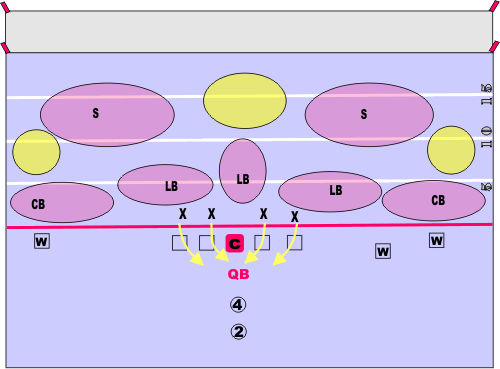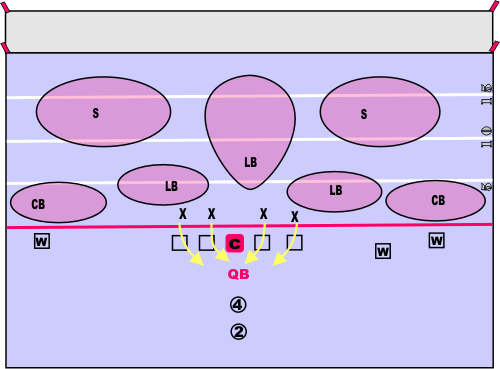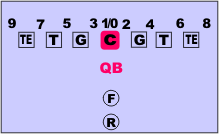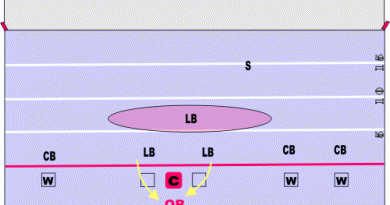Tampa Cover 2 Defense
The “Tampa 2” is a defensive strategy that was popularized by the Tampa Bay Buccaneers football team in the late 1990s and early 2000s. It was designed by then head coach Tony Dungy, defensive coordinator Monte Kiffin, and then linebackers coach Lovie Smith. Dungy first learned the Cover 2 while playing for the Steelers in the late 70s and eventually developed this new form of the Cover 2 in Tampa.
Cover 2 Defense vs Tampa 2 Defense
The Tampa 2 scheme relies heavily on extremely speedy defensive players and a hard hitting secondary that loves to gang tackle. Further, the Tampa 2 expects everyone to tackle in the run game: the safeties, the cornerbacks, and everyone in between. The Tampa 2 is run out of the usual 4-3 defense, but every player is responsible for his own gap up on the line and drops a middle linebacker into deeper coverage. The design behind the Tampa 2 was to stop the West Coast Offense that became popular and was spreading around the league.
Why the Tampa 2 Cover 2 Worked So Well
Of course it helps when you have a defensive lineman named Warren Sapp, a defensive end named Simeon Rice, a cornerback named Donnie Abraham, and a safety named John Lynch. These players were extremely fast and reacted quickly to the ball. Eventually these names would be replaced by Ronde Barber, Derrick Brooks, and others, but the system did not change. The secondary always played in a zone defense as you will see below. The Tampa 2 was a very easy scheme and easy to learn and teach. The only requirement was that the players be fast. As long as they were fast, the scheme worked.
Understanding the 43 Defense
In a standard 43 defense, the middle LB stays underneath the safeties and covers short underneath routes and helps in run defense. In the Tampa 2, the middle LB is expected to drop into deep coverage in the middle essentially converting a Cover 2 into a Cover 3. This protects against the deep pass very well and changes the assignments. Every player is now responsible for less field, and the deep routes are covered better. Only the other two LBs and the two CBs have to cover slightly more ground.
Below is the standard 43 Cover 2 defense. The safeties are responsible for 1/2 of the field deep. The corners and linebackers are each responsible for about 1/5 of the field in the shorter distances. This poses a problem, see the next figure.

This type of Cover 2 scheme leaves a lot of soft zones open. These soft spots in the defense can be exploited by teams that have accurate QBs. While there are very few weaknesses to the Cover 2, all zone coverages have weak spots or soft spots.
Cover 2 Defense Weaknesses
The Cover 2 leaves defenses wide open to deep post patterns, seam routes, medium range hooks, and teams that like to flood a zone. Because of how much ground the safety has to cover, deep passes can easily overload his zone. It’s very difficult for a safety to cover an entire half of a field. Offenses like to run a Stop or Out pattern to the sidelines. Once the receiver leaves the zone where the cornerback is covering, he will be open in one of the soft zones below. For the WR, it’s about an 8 yard run, while the safety may have to run about 20 yards to tackle him. It’s also a mismatch as most safeties in the NFL can not cover a receiver effectively. That’s why Tamp Bay relied heavily on speedy defensive players and gang tackling. Everyone has to run to the ball and make a tackle. See the soft spots below:

Why the Tampa 2 Cover 2 Defense Works Better
The Tampa 2 attempts to plug up these soft zones and fix this problem. So how does the Tampa 2 plug these holes?

The Tampa 2 coverage scheme attempts to plug up the soft spots in the usual Cover 2. The Tampa 2 emphasizes speed and a quick pass-rush. While the normal Cover 2 has each LB and CB covering about 1/5 of the field, as you saw above, and the safeties covering 1/2 the field deep, the Tampa 2 pulls the middle LB into a middle deep zone coverage as well, making it a a Cover 3. What this does is allows the safeties to have to cover less ground, so they can cover the traditional soft zone past the corners more effectively.
Since the middle LB drops into coverage, the other two LBs and CBs each have to cover about 1/4 of the field. Speed at every position is extremely important, because the LBs have to cover more ground than LBs are used to covering.
Back to 43 Defense Basics
The four Xs are your four defensive linemen. The three LBs are your linebackers. LBs are usually named for the position they play. There are 3 main positions; middle LB, weak side LB, and strong side LB. Weak, strong, and middle are also referred to as Will, Mike, and Sam. So a Sam blitz, is when the strong side LB moves up into a gap and blitzes. The strong side is the side where the TE is lined up on.
The CBs are the cornerbacks and the Ss are the safeties. Every player has a specific role based on how the offense lines up and what the defense is doing. The above configuration shows a Cover 2 type of defense.
What is Cover 2 Defense?
You have two safeties covering the deep routes. When you bring a safety up to blitz, or cover a WR man to man, you will end up with Cover 1.
Coverage assignments:
CBs:
The CBs play a short zone in the purple zone as above. They do not follow the receivers if they go too deep or too far to the middle. They stay put in their zones.
Ss:
The safeties cover any WRs that go deep and down field past the zone that is covered by the CBs.
LBs:
The LBs are crucial. They cover the RBs, the TE and anyone else that comes at them. If it is a running play, they go up and make the tackles. If the TE goes out on a pattern, they cover him as long as he is in their zone. Once he goes too deep or too far to the sidelines, they can leave him. Some defenses will chose to cover the TE man with a LB. Find out what your coach wants to do.
Xs:
The defensive line attacks the QB. Each X is responsible for a single gap. There responsibility is to go after the QB and tackle the RBs on run plays. Very simple.
Tampa 2 Coverage assignments:
Very little changes except for the middle LB drops into a deep middle coverage, creating a Cover 3.
In the Tampa 2 each X is responsible for a single gap.
Blitzes:
The Tampa 2 system relies heavily on the pressure generated up front by the defensive line and does not usually blitz.
Exposing the Tampa 2 Defense:
A team with a strong running game or a great play-action game can seriously stress the Tampa 2 defensive scheme. If the safety has to stop and think for a split second about a run, the soft spots behind the CBs have opened up again. The Tampa 2 was designed to work against teams that ran a West Coast Offense. Short passes, lots of zone exploitation, and the deep posts, corners, flags, and outs. The Tampa 2 was successful against the West Coast Offense, because West Coast teams don’t run as much as they pass. Hence, the Tampa 2 made more sense. The newer types of West Coast Offenses being used by teams like the Denver Broncos, Atlanta Falcons, and Carolina Panthers take full advantage of the run game and play very well against Tampa’s defense.


